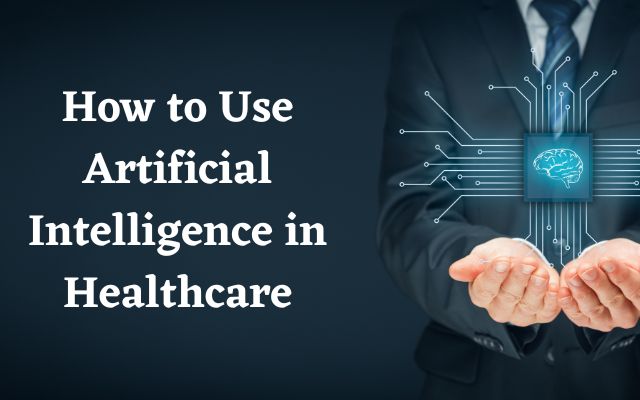How to Use Artificial Intelligence in Healthcare

Here is How to Use Artificial Intelligence in Healthcare. Artificial Intelligence (AI) is transforming the healthcare industry by improving patient outcomes, reducing costs, and enhancing operational efficiency. From automating administrative tasks to aiding diagnosis and treatment, AI is revolutionizing healthcare. In this article, we will provide a comprehensive guide on how to use AI in healthcare for healthcare professionals.
Understanding AI in Healthcare:
AI is the development of computer systems that can perform tasks that typically require human intelligence, such as visual perception, speech recognition, decision-making, and natural language processing. In healthcare, AI can be used to help identify diseases, create treatment plans, and monitor patients.
How to Use AI in Healthcare:
- Medical Imaging: AI algorithms can analyze medical images, such as X-rays, CT scans, and MRIs, to identify abnormalities and help with diagnosis. This helps healthcare professionals to detect diseases earlier and more accurately.
- Personalized Treatment: AI can analyze patient data, such as medical history and lab results, to create personalized treatment plans. This can help healthcare professionals to identify the best treatment options for their patients, leading to better patient outcomes.
- Electronic Health Records (EHRs): AI can analyze patient data within EHRs, including medical history, lab results, and medication history. This can help healthcare professionals to identify patterns and insights that would be difficult to identify manually.
- Chatbots: Chatbots can provide basic medical advice and triage patients. This can help reduce the workload of healthcare professionals, freeing them up to focus on more complex cases.
- Drug Discovery: AI can analyze vast amounts of data to identify new drug candidates and create personalized drug therapies.
Role of AI in Healthcare
Artificial Intelligence (AI) has a significant role to play in healthcare, transforming the industry in various ways. Here are some of the key roles that AI is playing in healthcare:
Diagnosis and Treatment: AI algorithms can analyze large amounts of patient data, such as medical records and lab results, to identify patterns and insights that would be difficult to identify manually. This can help healthcare professionals to make more accurate diagnoses and create personalized treatment plans.
Medical Imaging: AI algorithms can analyze medical images, such as X-rays, CT scans, and MRIs, to identify abnormalities and help with diagnosis. This helps healthcare professionals to detect diseases earlier and more accurately.
Drug Discovery: AI can analyze vast amounts of data to identify new drug candidates and create personalized drug therapies. This can lead to the development of new and more effective treatments.
Personalized Medicine: AI can analyze patient data to create personalized treatment plans. This can help healthcare professionals to identify the best treatment options for their patients, leading to better patient outcomes.
Administrative Tasks: AI can automate administrative tasks, such as scheduling appointments and managing electronic health records (EHRs). This can help healthcare professionals to focus on patient care.
Overall, AI is helping healthcare professionals to improve patient outcomes, reduce costs, and enhance operational efficiency. As the technology continues to develop, the role of AI in healthcare is expected to grow even further, transforming the industry in ways that we cannot yet imagine.
Pros and Cons of Artificial Intelligence in Healthcare
Pros:
- Improved Diagnosis and Treatment
- Medical Imaging
- Drug Discovery
- Personalized Medicine
- Operational Efficiency
Cons:
- Lack of Transparency
- Data Bias
- Privacy and Security Concerns
- Cost
- Legal and Ethical Concerns
- How To Run A Healthcare Business In The Metaverse World
- How to Use Robotic Process Automation in Business: A Guide for Companies
- How to Use Augmented Reality in Education: A Guide for Teachers
- AI in Healthcare: Revolutionizing Patient Care in the USA
Conclusion:
AI is revolutionizing the healthcare industry, from improving patient outcomes to reducing costs and enhancing operational efficiency. Healthcare professionals can use AI in various ways, such as medical imaging, personalized treatment, EHRs, chatbots, and drug discovery. By incorporating AI into their practices, healthcare professionals can improve patient outcomes, reduce costs, and enhance operational efficiency.






